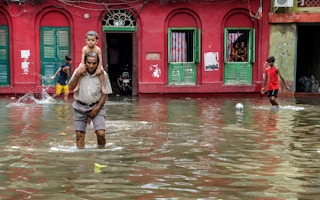
Farmers participating in a Narrative Workshop in Ambabai Village (Jhansi) facilitated by local partner Development Alternatives (DA). Photo by DA from report
All of the workshops followed a basic outline, in which the participants were asked to work through the following ideas:
- Values: What do you care about? What do you dislike? What makes you proud of who you are?
- National identity: How do you feel about India and your place in it?
- Changes: What changes have you noticed and what concerns do you have for the future?
- Climate change: What does it mean to you and what do you think causes it?
- Climate change impacts: What are the impacts and how will you and others cope?
- Renewables: What do renewables mean to you and can they replace fossil fuels?
Afterwards, the participants were given short passages — or these were read out to them — on various themes such as economy, responsibility or opportunity and they discussed what aspects appealed or did not appeal to them.
The hazy picture of coal and renewables
One interesting insight that emerged from the workshops was how weak the understanding of the causes of climate change were. While the groups immediately focused on pollution as a cause, they associated all forms of pollution, including plastics and even radioactive pollution as causes. It seems that visible forms of pollution caught the eye, so even if coal was mentioned – and it was mentioned in only two conversations – it was in the context of burning plastic or firecrackers. In fact, as the report states, “the Delhi groups did not even mention the contribution of coal-fired power stations to air pollution, despite the recent publicity surrounding the closure of the 705 MW Badarpur plant in south Delhi”.
It seems that out of sight was out of mind. This was also true of the understanding of the various groups about renewables. Their main understanding of renewable energy was solar power, through things such as solar cookers, or small products like calculators and solar lamps. As many of these were early products, the association was not always positive. Despite India massively expanding large solar plants, these were not discussed, nor did wind power or hydropower find much space in the conversation. The groups saw renewable energy as essentially a small impact story.
Nevertheless they were enthusiastic about it being clean, and were also keen about aspects of self-sustainability. The idea of India as a leader of developing countries – though not a world leader – in the adoption of such technologies was easily embraced.
A world increasingly out of skew
The cleanliness aspect, one which may have led the participants associating all forms of pollution with creating climate change, was reflected in health concerns. Health concerns featured prominently, sometimes even above jobs and economics, through impact on breathing and asthma and also the spread of diseases such as dengue and chikungunya – whose spread may be linked to climate change. Everything from heat-strokes, to skin cancer (confusing climate change with ozone layer depletion) came up for discussion.
In a sense this reflected a certain idea of climate change being a break from the past, from a more ordered and understandable time. The participants, especially from rural areas, had a very strong association with the monsoon – which provides approximately 70 per cent of the rain water in the country – and considered that the monsoons had been disturbed. They saw climate change as a way that disturbed their harmony with the world.
In a way, this was too strongly represented, in that they associated all extreme weather events – rather than the increase in them – with climate change. Given that local customs and festivals are usually linked to reliable weather patterns, the departure from such patterns was seen as deeply destabilising, with a large and negative impact on water, especially for farming.
Interestingly, this was also reflected in who the workshop participants blamed for the problems and how. Instead of broader ideas of climate justice, they considered climate change and associated problems as an outcome of people in power misusing their authority. In other words, a better world, a solution to climate change, would come about by proper conduct rather than opposing something like the car industry or such actions.
This study, the first of its kind, points out how differently Indians seem to view issues of climate change and renewable energy, as compared to groups in developed countries. It is, of course, very important to note that this was a small group of test subjects, despite the efforts at representing a multiplicity of viewpoints, and cannot be said to be representative of all Indians.
Nevertheless it points to how the government, NGOs and industry leaders may wish to tailor their communication to an Indian audience.
Full disclosure: The South Asia director of thethirdpole.net, Joydeep Gupta, was an occasional participant in the initial planning workshop.
Omair Ahmad is Managing Editor, South Asia, thethirdpole.net.This article is republished from thethirdpole.net.









